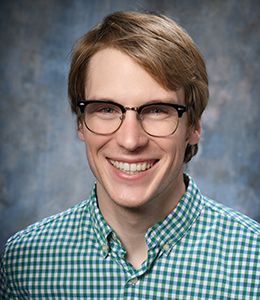
Joseph W. Metz, PhD
- Assistant Professor of Philosophy
Education
- PhD, Philosophy (2022)
University of Arizona (AZ) - BA, Philosophy (2013)
Duke University (NC)
About Me
I accidentally stumbled into philosophy as a first-year undergraduate with the last course registration window. I quickly fell in love with the field, and philosophy went from an elective to a minor to a major to a PhD. I strive to pay forward the enthusiasm that my professors showed me, and I hope my students enjoy the (sometimes accidental) chance to study some of the coolest stuff there is.
Sometimes philosophical questions seem arcane or silly at first glance, but upon closer examination, seemingly simple questions turn out not to have obvious answers. For instance, it seems obvious what makes us the same person across time - until we consider that answers about souls, bodies, memories, brains, and personalities all face serious problems. Doubting our knowledge of the external world seems ridiculous - until we examine Descartes' thought experiments or try to prove we aren't living in a simulation. It's obvious we're free - until we confront determinism (and then it's obvious we aren't free - until we examine yet more views on free will). Seemingly straightforward ethical principles frequently conflict, and we need non-arbitrary ways of adjudicating these conflicts.
In my classes, I work to connect the material under discussion to related areas in philosophy and in other disciplines. This helps students understand the importance of what they are learning and helps them apply it to material they are already familiar with. I also try to instill the importance of asking the rights questions and appreciating that the answers to deep questions are rarely simple.
Research Interests
My research interests lie in agency, moral responsibility and free will, metaphysics, the philosophy of action, applied ethics, and the intersections between these areas.
Much important philosophical work on moral responsibility and agency has traditionally focused on the positive aspects of our agency - what it is to be praiseworthy or blameworthy for our actions, what it is for our behaviors to belong to us, what it is to act intentionally, and so on? Much of my research centers on investigating the negative side of our agency - responsibility for our omissions, non-doings, etc. For instance, can I cause my plant to die by failing to water it, and can I be blameworthy for that omission?
In my dissertation "Much to Do about Non-Things: Exploring Agency and Responsibility Through Omissions," I defend a unified account of moral responsibility for actions and omissions based on abilities. I also explore several important resulting asymmetries between actions and omissions, which impact agency, regret, moral responsibility, luck, causation, and issues in applied ethics. I have also expanded this research to include collective omissions and failures to act. This involves exploring how we can contribute to collective harms – such as famines, climate change, and structural injustices – via our failures to act, in addition to our actions. I model when, why, and how we can be morally responsible for these contributions.
I also have projects on omissions of omissions (forgetting not to do something is importantly different than simply doing it) and impairments to agency found primarily in cults.
I (unfortunately) enjoy making bad puns in my writing.
Publications
- Metz, J. (2025). Unlearning Agency: Lessons from Cults. Ergo, 12(57), 1510-1530.
- Metz, J. (2025). Why there are no Frankfurt-style omission cases. Noûs, 59(1), 47-65. https://doi.org/10.1111/nous.12500
- Metz, J. (2024). Preemptive omissions. Erkenntnis, 83(9): 1117-1138.
- Metz, J. ( 2023). Higher-order omissions and the stacked view of agency. Philosophical Issues, 33(1): 170-182.
- Metz, J. (2021). Omissions, moral luck, and minding the (epistemic) gap. Canadian Journal of Philosophy, 51(4), 301-314.
- Metz, J. (2021). An ability-based theory of responsibility for collective omissions. Philosophical Studies, 178(8), 2665-2685.
- Metz, J. (2020). Keeping it simple: Rethinking abilities and moral responsibility. Pacific Philosophical Quarterly, 101(4), 651-668.
- Metz, J. (2019). FOMO and regret for non-doings. Social Theory and Practice, 45(3), 452-470.
Professional Affiliations & Memberships
American Philosophical Association
Awards
Joel Feinberg Dissertation Fellowship, University of Arizona (2017)
